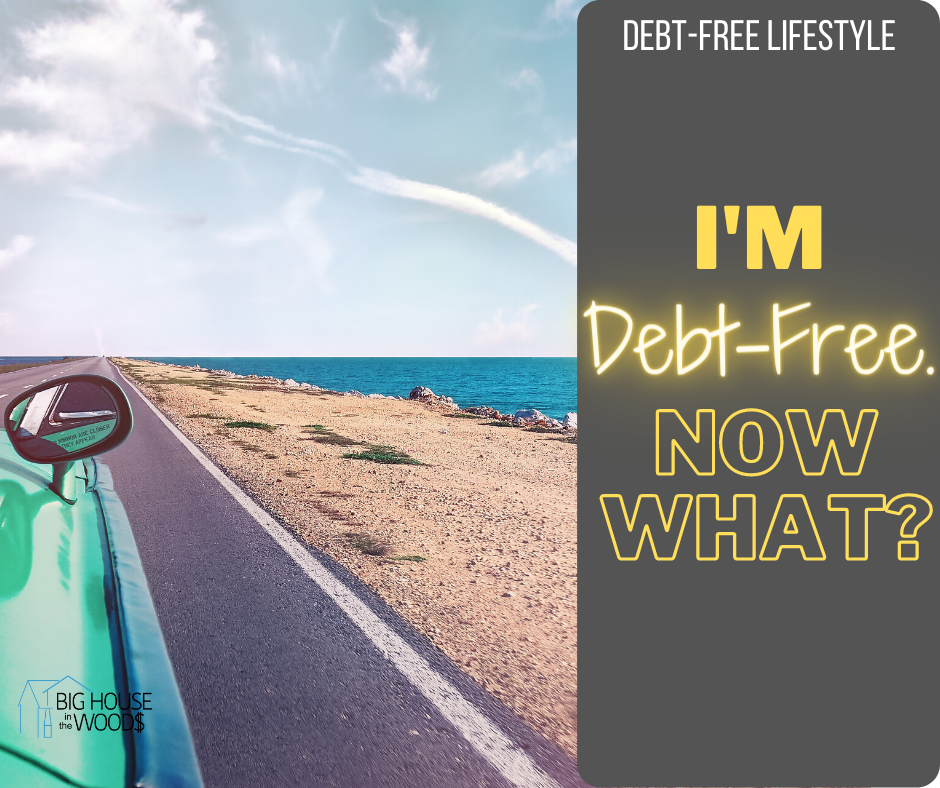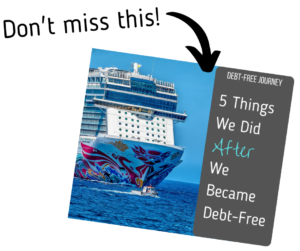Being debt-free and mortgage-free is a huge accomplishment. I know that we worked hard to get where we are today. If you are in the same boat then you know what an uphill climb it can be to get to this point. But it feels so good to be at the top, doesn’t it?
We are debt-free
We have been debt-free since we were 25 years old. I paid off my student loans the first year after college. Then, when we were married, we paid off our first (and only) mortgage in 13 months.
Since then, we have acquired no more debt.
I think a lot of people who reach their debt-free goals have the question, “I’m debt-free. Now what?” Your big goal was to be debt-free and mortgage-free. What are you supposed to do when you reach that goal?
I will tell you what we have been doing!

Debt-Free, Now What?
We’ve been without debt for about 10 years now. Recently, I was asked, “Now that you have everything paid off, do you continue to live like you have been (“extreme saving mode”), or have you started spending now?
That’s a good question.
Are we still saving or have we become big spenders?
Do we sit around in the evenings and enjoy debt-free caviar or are we still boycotting cheese?
I’ll tell you…
We have loosened up a little.
We no longer live in “extreme mode” like we did while we were paying off our first and only mortgage.
For example, we buy cheese now. 🙂
We have also bought 10 acres in another part of the state, 5 wooded acres near The Man’s work, built our dream house (debt-free, of course), two UTVs (one for a single rider and one for the whole family), etc.
We also go out-to-eat when we feel like it (which isn’t often because we like to eat at home).
We no longer post a budget on the front of the fridge but we do pay attention to our spending and discuss things before we buy them.
We travel.
As of today, we have been on 10 cruises. We left on our first cruise immediately after paying off our mortgage back in 2011. We have been on 4 different cruise lines and, if you are interested, I can tell you which one was my favorite and why! We had a few hiccups while preparing for cruise #10 but we still had an amazing trip to Galveston and we met so many awesome people on the trip (as usual)!
We have swam with stingrays in the Cayman Islands, climbed Mayan Ruins in Mexico, enjoyed the Caribbean sun in Cozumel so many times, dined at a local restaurant in Jamaica, and hiked in Honduras (just to name a few).
We love to stay at B&Bs in Historic Homes when we travel. We also enjoy traveling around our state and visiting state parks.
We Invest.
We put money into our 401(K)s and IRAs. The best financial decision we can make is to allow our hard-earned money to grow interest on its own.
If you want to learn more about 401(k)s, Investopedia has a great article about Strategies to Maximize your 401(k).
Here are a few key takeaways to get you started:
401(k) plans typically offer mutual funds that range from conservative to aggressive.
Investopedia
Before choosing, consider your risk tolerance, age, and the amount you’ll need to retire.
Avoid funds with high fees.
Be sure to diversify your investments to mitigate risk.
At a minimum, contribute enough to maximize your employer’s match.
Once you have established a portfolio, monitor its performance and rebalance when necessary.
We Give.
Being out of debt means we have more money to give to our favorite charities and organizations.
When money was tight because we were putting as much as we could toward our mortgage, we gave what we could. Now that everything is paid for, we have the opportunity to bless others through our favorite charities and organizations.
If you are looking for a quality charity to give your money to, be sure to research them on Charity Navigator first to see how your money will be used.
Charity Navigator was launched in spring 2001 by John P. (Pat) Dugan, a wealthy pharmaceutical executive and philanthropist. The group’s mission was to help “…donors make informed giving decisions and enabling well-run charities to demonstrate their commitment to proper stewardship” of donor dollars. Initially, Charity Navigator provided financial ratings for 1,100 charities, and has data on 8,500 as of mid-2017.
Wikipedia
We Still Save.
Are we buying high-end watches, overpriced clothes, brand new cars, and paying a company to keep our land perfectly manicured?
No.
You know me better than that by now.
We are still savers. We still feel that most products out there haven’t earned our money and we won’t fork it over.
I love my cheap little Walmart watch. I think it looks good on me. I just wish I knew why the alarm goes off at 4:01 each afternoon…
We enjoy buying quality clothes at our favorite thrift store because that thrift store uses its profits to support families in need.
We buy used cars because, well, we aren’t suckers.
And, we do all of the “up-keep” on our land (which isn’t too bad because we prefer an “English garden” look where the wildflowers are abundant).
The average U.S. adult spends $1,497 per month on nonessential items, according to research commissioned by Ladder and conducted by OnePoll. All told, that’s roughly $18,000 a year on things we can all do without. And that’s a lot of money, considering the extent to which Americans are letting their savings and other critical goals fall by the wayside.
Motley Fool
We work hard for our money. (To be clear, The Man is the one who actually makes the money. I’m a homemaker so I don’t contribute monetarily to our family. But, as all homemakers know, I work hard, and “his” money is actually “our” money.)
Being debt-free and mortgage-free was never the end goal for us.
The end goal is much bigger…
We Plan to Retire Early (around 45-50)
Retiring early is very important to us.
We love the life we have right now and we have a list of things we want to do in the future as well. We would like to travel the United States like nomads (in a converted school bus, if I can convince The Man), live in Portugal, see what Ireland is like, spend a lot of time in one of our favorite spots…the list goes on.
If you’re serious about learning how to retire early, there are some things you need to do:
Determine what kind of lifestyle you want in retirement.
Create a mock retirement budget.
Evaluate your current financial situation.
Get serious about lifestyle changes.
Pour everything into investing.
Meet regularly with a financial advisor.
Play it smart when you retire early.
Dave Ramsey
We Created a Bucket List
After you pay off everything, and you’re looking for some adventure just consult your bucket list! Here is ours: 24 Bucket List Adventures We’re Trying to Conquer Since Becoming Debt-Free
What’s the takeaway?
So, even though we don’t live in “extreme mode” anymore, we haven’t become big spenders. We have loosened up a little but our views on money are the same.
We still value our money.
That means that we think over all purchases before we make them. Products and services have to earn our money. And, let me tell you, it takes a lot to earn our money. We aren’t impressed by trends or the latest gadgets. We aren’t tempted by “stuff.”
We have a choice; we could have brand new cars, boats, UTVs, and other toys every year (and work until we’re 70) OR we could quit the rat race early (around 45-50).
I choose option #2.
The tendency to splurge consistently on nonessentials is causing Americans to skimp on other important items. Case in point: A good 38% of Americans claim they can’t afford to fund a retirement plan because they don’t have enough money. Meanwhile, 35% say they can’t afford a life insurance policy, 28% can’t afford to pay off credit card debt, and 26% can’t afford car repairs.
Motley Fool
All of this spending on nonessentials is also causing Americans to neglect their near-term savings. An alarming 60% of U.S. adults don’t have enough money in savings to cover a $1,000 expense.
We enjoyed the road to becoming debt-free and mortgage-free. We have also enjoyed the debt-free lifestyle afterward while still saving for the future.
We still swim upstream.
As always, feel free to leave me a comment. I love to hear from you.
All the best,
Lindsey

